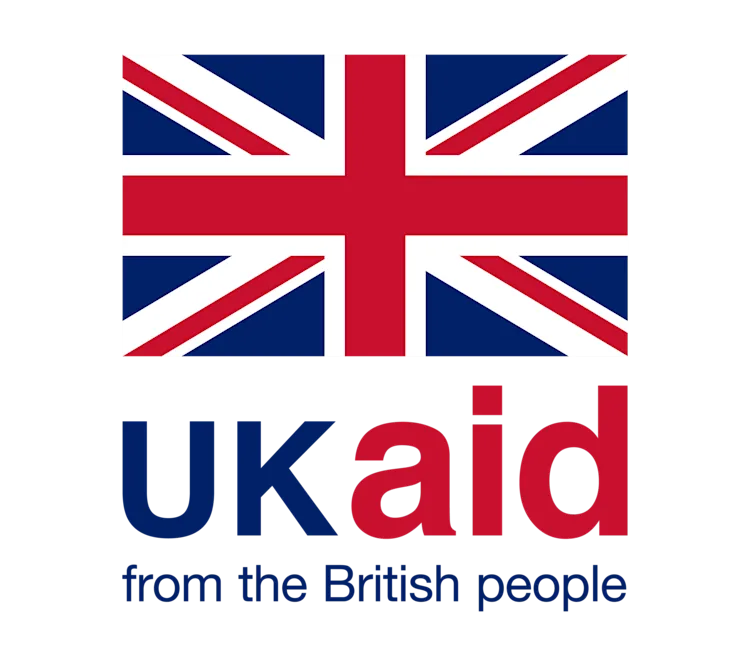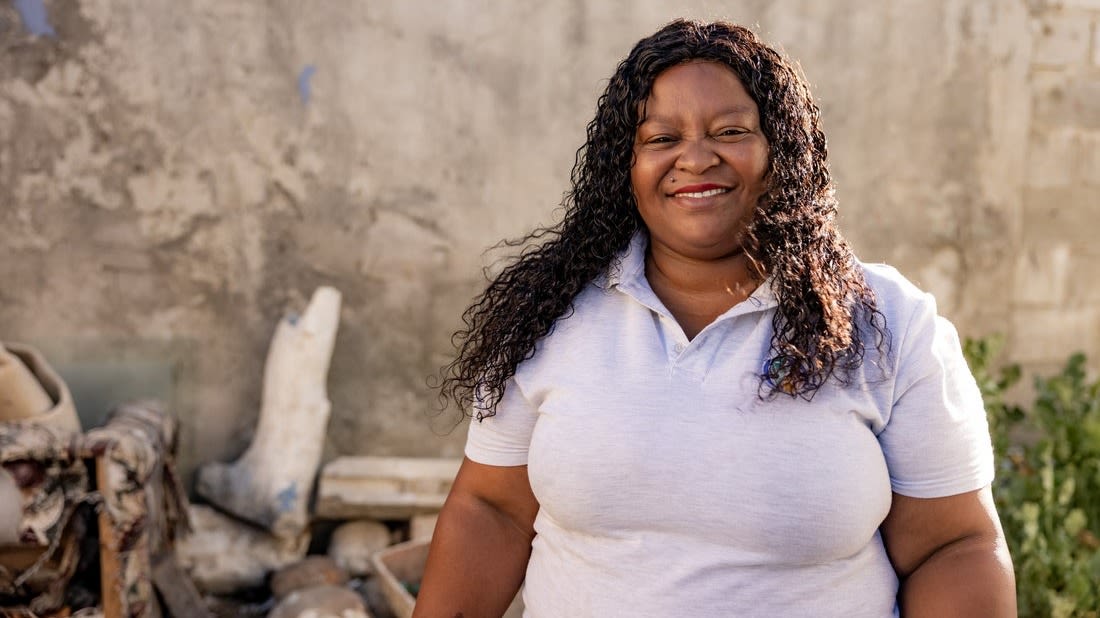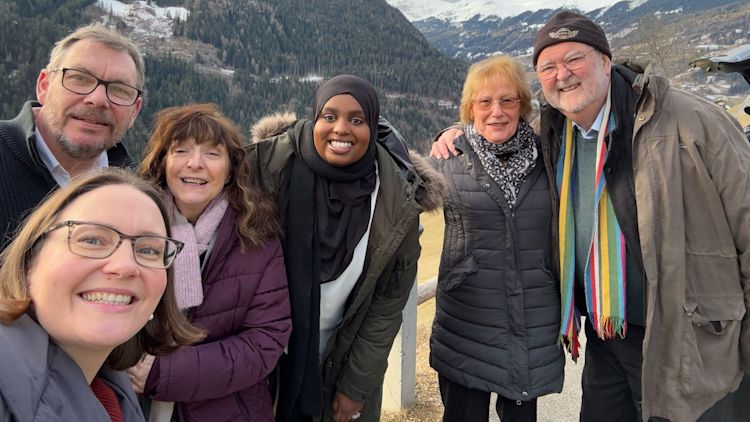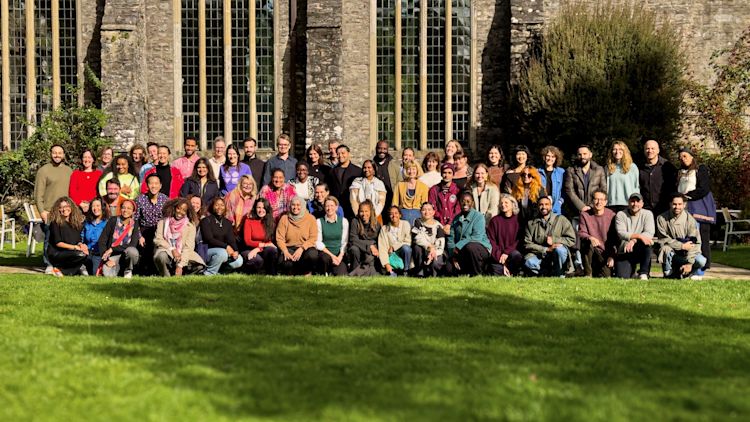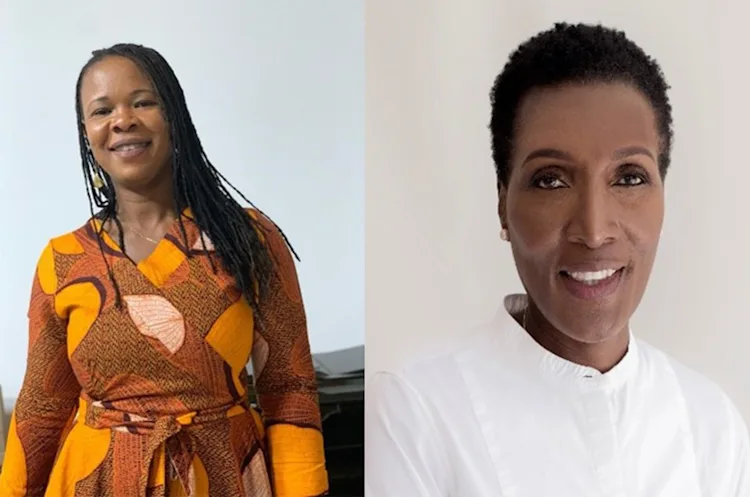
To mark International Women’s Day, Comic Relief and the UK Government’s flagship programme ‘Shifting the Power’ invites you to an ‘in conversation with’ two trailblazing leaders who are shifting power and shifting narratives in Africa. Our first guest Eunice Agbenyadzi is a human rights activist, gender equality and social inclusion (GESI) practitioner with over sixteen years’ experience in the development sector. She is passionate about social justice and has contributed to promoting this in the different roles she has held. Eunice has coordinated interventions in partnership with civil society and state actors towards good governance, accountability, gender, and social inclusion. She is currently the Head of programmes at STAR-Ghana(opens in new window) – a foundation based in Ghana that works towards creating platforms for ordinary people, particularly the most marginalised in society to become active citizens who demand a positive change in their lives and communities.
Also joining us is Moky Makura, a narrative and communication expert with a wealth of experience gained from 25 years in the communications industry, serving almost every aspect of specialist communications from financial to philanthropic foundations across Africa. Moky is the Executive Director of Africa No Filter(opens in new window), a donor collaborative organisation that strives to support the development of nuanced and contemporary stories that shift stereotypical and harmful narratives within and about Africa.
Shifting the Power is a programme co-funded by Comic Relief and the UK Government to support locally- led organisations to bring about lasting change in their communities by helping women and girls to fulfil their potential, allowing young children to survive and thrive, giving people access to effective mental health services and tackling climate change.
International Women’s Day is a globally recognised day- what does international women’s day mean to you?
Moky: Great question! International Women’s Day is a day to force the world to think about women and the role that we play in society. My husband always says Valentine’s Day is not an important day because I love you every day and that's his way of saying we're not going to just focus on love for one day. But, you know, creating a moment in time in a very busy world when there's a lot going on to stop and think about the issue of women is so important. I think to a certain extent it's been hijacked by a lot of organisations, but I really think it does play a significant role to make people reflect and look back to see the progress made in the last year.
Eunice: International Women's Day is a day that reminds the world of the commitments made towards achieving women's rights in all its dimensions. It's a day that everyone pauses, particularly leaders, to take stock of what they have done together with others to ensure that women and girls have their rights fulfilled and reflect on the contributions we are making towards creating an equal world. I feel that International Women's Day gives me an opportunity to speak on a bigger platform, to link up with other women rights activists, and together we strengthen each other in the struggle.
This year’s theme is #embracingequity – why is creating an inclusive world so important?
Moky: I recently put a blog on LinkedIn that talks about how often women's voices were heard in the media. If you imagine a world where 50% of that population are not given a platform that's currently what it means when you take women out of the equation - where the views of women don't matter. Gender equity is where we bring in justice and fairness - embracing equity is making sure that women have a voice making sure women are equally at the party. It’s important we have an inclusive world where women are included as opposed to excluded. It's only when you start looking at each situation and ask, is this fair?
Eunice: I think that inclusion is a rights issue but it's also about smart economics, people have the right to express themselves and access opportunities to better contribute to societal development and so it's doesn’t make any sense that only half of the population has the privilege or has more access to opportunities. Often it is the women and the girls who have less opportunities and so their potential, talent and skills are not harnessed. If women are empowered than we address the issues of reducing poverty, promoting inclusion, peace, security, and stability that the world is struggling to deal with. You can't achieve that if half of the population are not given opportunities to be who they want to be, to do what they want to do and the chance to contribute to their communities and the world.
What does gender equity mean to you?
Eunice: Gender equity means fairness between all genders, it's important to understand the perspective of equity and how it addresses historical imbalances that have created the situation where men have more privileges than women. We have seen equity as a stopgap because it's a means to achieving equality - if there's fairness then everybody has an opportunity to realize their potential. For me, the purpose of equity is to correct outdated and wrong views held in the past and if the playing field isn’t balanced, we cannot achieve real equality.
Moky: Yeah, I want to just add because we're talking about the level playing field - there was a film that went viral that looked at inequity in the US System between black and white people. The participants were asked a series of questions and you literally could see the disadvantages that black people faced and how they were left behind at the starting point where others’ circumstances and privilege meant they could step forward - there was such a powerful way of outlining in that. We did a similar activity with women and in a very visceral way you see the inequity and the set of circumstances that make it anything but a level playing field for women.
You both work for amazing organisations, is there a project or piece of work using the lens of Gender Equity that you are proud of?
Moky: At Africa No Filter, I love the work we are doing to shift narratives and stereotypical views about Africa. We are also a grant maker and I feel that we've had to be very deliberate about making sure that we are giving grants out equally to women as we do for men. We want to make sure that our grants are accessible, transparent and you don't have to know anybody or have to be in any sort of privileged network of funders and that’s partly why we put our call outs on social media. We’ve often noticed that we have much fewer applications by women – if you look at the top 10 applications we get, we probably give up to 90% of our grants to men so we are deliberate in our call outs and want at least 50% of grants to go to women-led organisations or women owned initiatives. It’s not been easy, and it takes a lot more time but there have been times we’ve had to make explicit gender-specific call outs because that was the only way we could make sure that we had women there and that they knew it was for them.
When I think about why at times women don't step forward, I remember the time I was part of a university that started an entrepreneurship course, and they wanted more women to apply (there were no women on the course). Eventually, they paused to ask why this was the case and the response they got was that women didn’t see themselves as entrepreneurs – even though they were running their own businesses they only viewed men as entrepreneurs. So, I sometimes feel like we're our own worst enemies, we often need to be encouraged or reassured that we are more than qualified. We must consider all the other factors at play and keep this in mind when giving grants or opening recruitment.
Eunice: Our experience as a grant maker has been very different – we work with women led organisations and those who support women's rights issues. We seek to work in solidarity with underserved groups and in all our partnerships we promote the idea of inclusive programming. When we put out a call, I think that 60% of our applications are from women's right organisations because we have been known as an organisation that promotes gender equality and social inclusion. I do agree that sometimes we have to encourage women more, but I think that it is also raises the point of how we design grants to speak with different types of organisations. We can’t assume that all institutions are on the same level, have the same interest, and therefore must have the same templates for applications. There are times that we make invitation-only call outs because we want to target properly and build partnerships around projects rather than shortlisting competitive proposals etc. We have been quite deliberate, and we have made a political choice to stand with and to promote women's rights. It does require a lot of work, because remember that we are coming from a history where we've not been taught to fight, we've not been taught to be as assertive as men and so you will find those traits in organisations that are led by women and the challenge for us is to introduce mechanisms that help break those mental constructs.
Looking through an intersectional lens, what can those with privilege do to help achieve equality?
Eunice: I think that those in privileged positions and places can use their influence through building solidarity with women and the issues they face. We are an organisation that works in solidarity with a variety of women groups and women of different backgrounds, social class, and positions; from women living with disabilities to women in local and national governance. We use our grants as a mechanism and deploy our resources to facilitate those who are solidarity building. It is also important for us being present and showing up when our partners have critical events -we have been on the streets side by side with women groups who were advocating for the passage of the affirmative action deal in Ghana, we have been on the floors of Parliament, we have joined in petition presentations. We actively raise questions and try to address specific issues such as young girls dropping out of school due to pregnancy by campaigning for their re-entry into education. We work to support maternal health care. My point is we have access to power, and it is our duty to advocate for women's rights. When we have grants, we use this funding to promote the work of women’s rights organisations who are raising calls to action and we join them in solidarity – so if you are aware of your privilege stand by your fellow woman, advocate for her as this is how we can all promote equality.
Moky: You know, one of the big things for me is that everybody can do something - you mentioned white women who are in positions of privilege - they need to let other women in. Men too because a lot of the time it’s men who are in decision making positions. Often, it's the father that determines which of his children will go to school, it's a father that determines which of his children he gives a chunk of his money to. My point is that gender is not a standalone thing, it varies, and it is multidimensional, there are so many factors at play there is race, age, class - it’s not just about gender. When looking at gender from an age perspective, the things that affect younger girls will be different to what effects older women. I think often about careers and how women can navigate and develop because that's the stage I’m in. So, I always think about when women get into positions of power are they letting other women in? Are they mentoring younger girls and showing them the ropes? Are they mentoring them to navigate the corporate world because they don’t have connections or networks? There are so many ways that people who are in different positions can help - white women and women of colour can help and men can absolutely help. I feel that, in this whole gender equity/gender representation issue the biggest factor that we need to get on board are men, particularly because in our society patriarchy is still huge.
Moky – you are the ED of ANF – working on shifting and changing negative narratives about Africa and unethical storytelling – what have some of the highlights and challenges been? What would you change about the assumptions made about women in Africa?
Moky: One of the highlights I will say for me is that an organisation like ours even exists and is tackling issues around the inaccurate and negative narratives about Africa. The fact that you know, years and years later we are still predominantly seen as a broken continent where people lack agency and where we're largely dependent on richer western sources to make the changes that we want to see. So, for me, just the fact that we exist is an absolute highlight, that we can identify the narratives that we're looking to change and we’re in a position with some good funding (thank you, Comic Relief!) and our other funders to be able to do this work.
There are challenges around narratives and portrayals because narratives have an impact, what you believe about something informs how you behave. The narrative about Africa dictates a lot of the way donors give to Africa. There is an unequal balance of power, Africa is often seen as purely as a beneficiary, and not somebody with a voice at the table. There are lots of movements around decolonizing aid which advocate that we are not just recipients - we are partners and leading on solutions. Gone are the days (almost) where solutions are developed outside of the continent to be implemented by international partners on the continent.
On assumptions I want to change - I think if there is a ranking of people in the world order, I think it starts off with white men followed by white women, followed by black men and then maybe women of colour but it’s African women who are right at the bottom because so often we are depicted as the victim in any situation. If you analyse media and how they cover disasters, I’m not saying this always happens but typically the way it would be covered is – amidst a disaster, it’s the woman who is holding the child in a state of despair - then it cuts to the men as the experts who are given the platform or airtime to talk about context and solutions needed and this perpetuates this idea that woman are victims only. So that's an assumption that I think many people still have about women - with African women at the bottom of the ladder in terms of hierarchy, in terms of decision making, in terms of technical expertise and so much more.
Eunice - Shifting the Power looks at transferring power and influence to those closer to community issues – how important are women as leaders and changemakers in the community - are there any examples you can highlight?
Many times, when we talk about power, we think that it is only men who have power and women do not possess any. Isn't it that women have always had power? The real challenge has been how their power has been recognised and drawn into, you know, a formal process - for example, how their power is valued or acknowledged in comparison to other forms of power that men exhibit in the community. It's amazing the roles that women play, they are at the forefront of community development - for example, we in Ghana have a very strong traditional governance and women are a core part of that system. When you talk about mobilizing community around community issues, you would normally find Queen Mothers who are getting everybody together. At STAR-Ghana, we have a portfolio that we refer to as ‘Community Combat’, where it is women leading and training communities, educating at local level around prevention of gender-based violence, representing community issues in policy and local decision making. Women are at the heart of community transformations and often creating impacts – the failure has been not recognizing the role they play. As a foundation (STAR-Ghana) and as an activist I want to ensure and promote the recognition of women as official leaders and ensure they have a platform.
What women have inspired you and why?
Moky: I think from a career perspective the person that's really kind of influenced me and inspired is Oprah Winfrey. The fact that she is a black woman who’s transcended every expectation. To have a black woman get to where she is and the way she conducts herself - she's one of the most powerful and richest women. I recently listened to a commencement speech she delivered at a university where she said the best thing any young person can do is live the highest representation of themselves as in be who you are supposed to be and do it to the best of your ability. She just says a lot of things that resonate for me so, if I were to say one person, it's always Oprah.
Eunice: I’m going to shine light to someone closer to home because I think that this is an opportunity to talk about someone that the world may not know about. A person who has been very instrumental in the women's rights movements here in Ghana – the former first lady, Nana Konadu Agyemang Rawlings. She was one of the founders and presidents of the 31st December Women’s Movement which was a historic moment in Ghana, where women felt they had a space to talk and create the societies and the nation that we want to see – the movement gave birth to women political leaders who were shaping social issues that were not talked about in the policy space. One of her most remarkable attributes was her ability to work across different political parties and live in a world today where it is very easy to ignore a voice that is not coming from your own political circle but she's been able to unify women across all political divisions. She set up her own political party which was historic because we haven’t had any political parties led by a female candidate. What inspires me most is her tenacity, assertiveness, and ability to work with all sorts of women to promote women's issues.
We paused the interview for our guests to raise any questions or share thoughts:
Eunice: I have dilemmas about how long it will take to overcome this struggle because it appears there are two struggles that you find: The first is disparities in incomes among women and men with the same qualification, working in the same industry at the same level but men are paid significantly more. Secondly, I think also at a global level we have very few women in leadership positions in general and so I ask myself, how long would it take to really have that equal world where it is not only a local issue but a transformation that is global. We know that it's only when we have more women in decision-making positions that we will see progress faster than we are seeing now. So, I ask, you know, how long will it take and what will it take to see progress?
Moky: Yeah, I mean, I know that’s a rhetorical question or a philosophical question even, but one of the things that I would like to answer when you say what will it take? I think one of the biggest things that can shift this is that women see more people like them in the places they want to get to, women must be able to dream. If you can dream it then you can be it. Some years ago, I wrote a book called ‘Africa's Greatest Entrepreneurs’(opens in new window), and I started doing talks about the book and what made a great entrepreneur – the one aspect that consistently came out from all the successful entrepreneurs I spoke to was that they had a vision for themselves that was bigger than the community and the environment in which they lived. So, if you cannot dream yourself or see yourself in a different place, we're not going to get there as women, and that goes down to us having role models and women telling their stories. Women - if you are in a position of power share your story because stories inspire. You know, every little girl who is stuck somewhere who maybe can't go to school has to know that there is a woman who did go to school in her community and if she did, I can, too. That is the single, most powerful game changing thing that can change things from within. We can put all the social structures outside but if we are not creating girls who have visions and can dream it, it will never be it.
What springs to mind when you hear the words ‘African Women’?
Moky: African women are very powerful whether we're public about it or not - ultimately how we present it is entirely up to us and people must recognise that. So, when I think about African women (and I came from a culture of Yoruba women who are incredibly strong) power is not necessarily leading from the front. I think we need to understand that for me an African woman is a powerful woman, and maybe not always in the way we see power, not always in the conventional way; but you just need to know the power starts from within, and that's how I see African women - incredibly powerful. That's why I say people shouldn’t underestimate us and to watch this space.
Eunice: I think that Moky has nailed it - the African woman is a powerful leader, and it doesn't matter where you are leading from, but that we are leading, we must talk about ourselves and our leadership and highlight the influences that we have. Can you imagine the influence of the African woman at home? We are the ones raising the children, teaching them tradition, teaching them our practices, raising them to become the people that our society needs. We are also teaching in schools, leading in health; representing our constituencies as members of parliament, in academia leading universities, we are in media educating and shaping visions - the African woman does all of this, and many times we seem to see the African woman in the traditional sense of only being a mother, only being a wife, and only being visible in the home. We are more than that and we need to narrate the different ways that we, as women, influence society.
